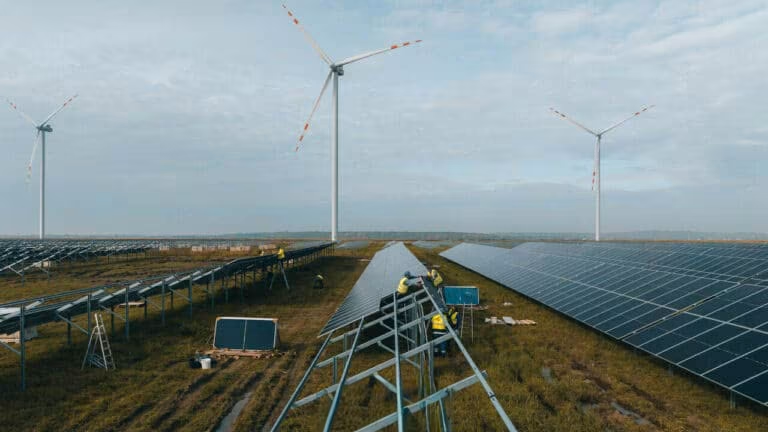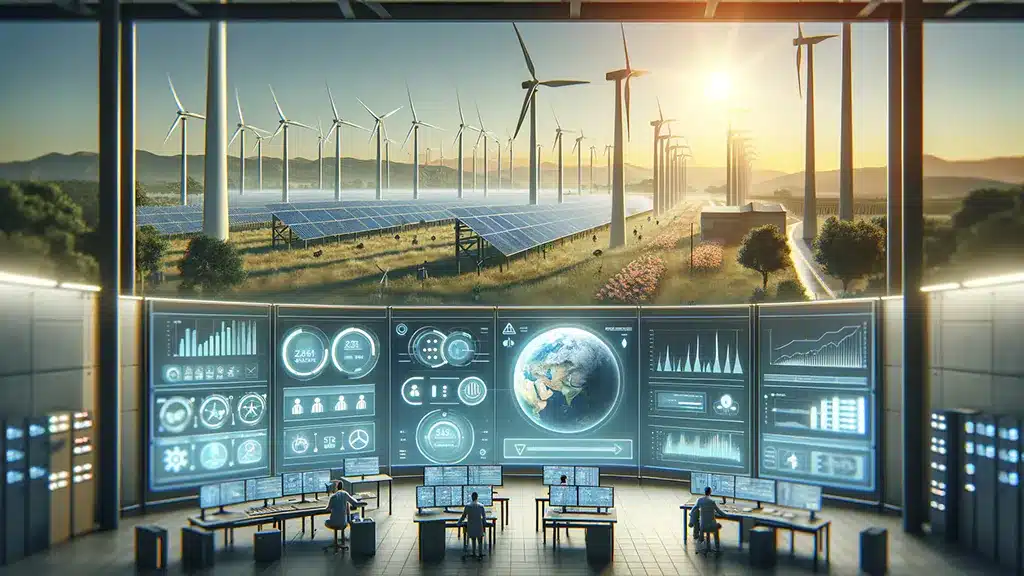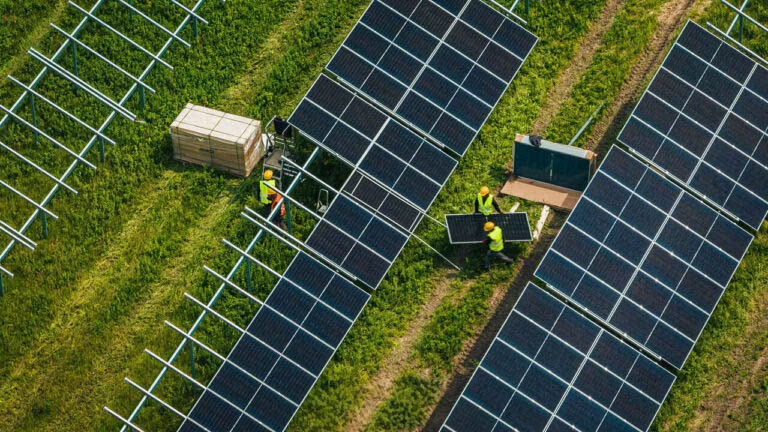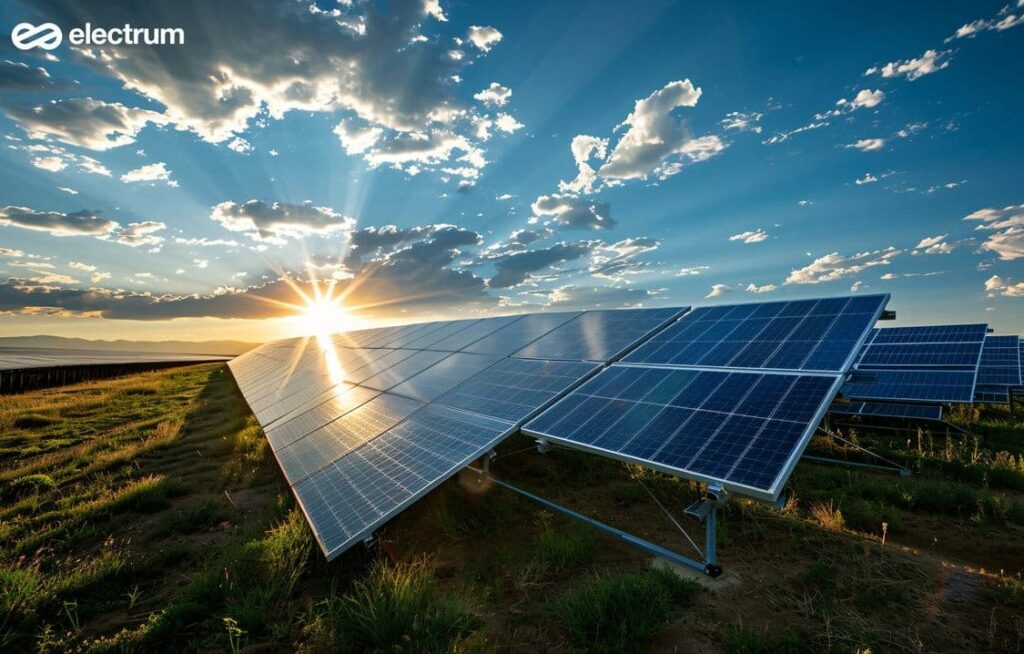Introduction to Industrial Solar Power
Industrial solar power can completely eliminate electricity bills and provide companies with full energy independence. The profitability of solar energy for companies is undeniable – a company utilizing solar energy is a company of the future.
How Does Industrial Photovoltaic Systems Work?
The power of an industrial solar installation is generated by converting solar energy into electricity using industrial solar panels. The operation of industrial solar power relies on large arrays of panels placed on the roofs of buildings or on designated areas. The energy produced by a solar investment can be:
- directly used by the production facility,
- stored,
- or sold to the power grid.
Industrial solar power is gaining popularity rapidly. Green sources of electricity come with four solid benefits.

Benefits of solar energy for companies
Energy Independence and Financial Gains
Investing in an industrial solar power installation can make your business independent from fluctuating electricity prices, leading to significant long-term energy savings and security. Additional income can be generated from selling excess energy to the grid. The profitability of solar power for industrial use is hard to dispute. Energy independence in times of rising prices is a substantial safeguard for business.
Brand image
Eco-friendly solutions like renewable energy positively impact a company’s image among customers and business partners. By promoting and practicing eco-friendly actions, you build a reputation as a responsible and innovative enterprise, attracting new customers and investors.
Environmental Benefits
Solar for business is a progressive, clean energy source that reduces CO2 emissions and other harmful substances, contributing to environmental protection. The benefits of solar power for businesses extend beyond individual companies and industrial plants, supporting global efforts toward sustainable development.
Technological Benefits and Innovation
Solar power for industrial use represents a step toward modern and innovative technologies. Installing solar panels often coincides with implementing new energy management systems, increasing operational efficiency and profitability.
Companies choosing industrial solar panels can also benefit from advanced technological solutions, such as smart grids or industrial energy storage systems, leading to further savings and increased reliability.
Read also: How energy storage systems revolutionize RES Market?
Types of Industrial Solar Power Installations
Micro-Installations
Photovoltaic systems up to 50 kWp, which are predominant in our country. They reduce energy costs and are typically installed on the roofs of residential buildings or small businesses. These systems can meet the basic energy needs of a household or small company, making them ideal for businesses looking to reduce electricity costs.
Small Installations
From 50 kWp to 1 MWp, these installations benefit larger industrial companies and production plants, allowing significant energy savings and potential income from selling excess energy.
Large Installations
Above 1 MWp, these are designed for major industrial plants or solar farms, significantly impacting the energy balance of the region. They are ideal for companies seeking protection against energy price increases and investing in sustainable development.
Large Installation or Small Solar Installation?
What size of solar installation is suitable for companies? It all depends on the electricity demand. Solar power for manufacturing facilities: how to get started? You need to determine the energy needs of the company.

Steps to Implement Industrial Solar Power
Energy Consumption Analysis
To effectively plan the implementation of a solar installation, it is advisable to start with an analysis of energy consumption within the company. Reviewing electricity bills from the past 12 months helps to understand average monthly usage and identify seasonal fluctuations that may affect energy demand. It is also important to consider peak consumption hours, which is crucial for designing a cost-effective investment.
Tariff Structure Analysis
The next step is to understand the energy tariffs and fee structures that will determine the choice of solar power for industry. Different energy tariffs can significantly impact the savings from a solar installation, depending on the time of day and the level of energy consumption. Electricity costs can be substantially reduced if the system is optimized for the most expensive periods of consumption.
Consultation with Experts
Consultation with the energy network operator or an energy advisor is essential to obtain precise data on electricity consumption and the technical requirements for connecting the solar installation to the grid. Solar power for manufacturing facilities will offer different opportunities compared to solar power for small businesses. Experts will assist in selecting the appropriate size of the installation and advise on how to best optimize the system for the specific needs of the company, ensuring maximum benefits from the solar installation and proposing modern photovoltaic solutions.
Contact us >> We will be responsible for designing the solar installation, ensuring accurate installation, and providing monitoring solutions. Become independent from energy prices today >>
Future Development Plans
If you are planning for growth or expansion, it is important to consider these plans when estimating energy demand. The solar installation for the facility should be designed not only for current needs but also with future requirements in mind. The capabilities of the solar installation must meet future demands.
Monitoring and Optimization
Modern photovoltaic technology and energy management systems allow for real-time monitoring of energy consumption and optimization of solar installation performance. This enables businesses to continuously adjust their energy needs and maximize energy savings. The source of photovoltaic energy is under constant supervision.

Read more: Solar energy monitoring | What You Need to Know?
The size of the solar installation for companies: Availability of space and solar installation possibilities
Manufacturing companies often have large roof areas or land that can be used for installing solar panels. Roofs of production halls, warehouses, and administrative buildings are ideal places for mounting solar panels, allowing for efficient use of available space and minimizing the need for additional land. Furthermore, ground-mounted solar farms (off-grid solar for industry) can be particularly beneficial for companies with extensive land not used for other purposes.
Read also: Electrum manages 2.2 MWp Off Grid Solar System – Electrum Holding
Tax incentives: Solar power for companies
Companies can also take advantage of tax incentives, such as depreciation deductions for the purchase and installation of solar systems. Businesses can deduct costs related to the solar installation from their taxable income, reducing the total amount of income tax owed. This is a beneficial solution that reduces the financial burden on the company in the long term and simplifies the accounting for solar power in businesses.
Preferential loans for solar power
Many banks and financial institutions offer preferential loans for investments in renewable energy sources. These loans often feature low interest rates and flexible repayment terms, making them accessible to many businesses.
Solar system lease
Solar system lease is an increasingly popular form of financing, especially among companies that do not want or cannot bear the high initial costs associated with purchasing a system. Leasing allows for the costs to be spread over installments, making it easier for businesses to manage their finances.
Costs and profitability of industrial solar power. Savings for companies through solar installations
The profitability of solar power for industrial companies is undeniable. By conducting a precise analysis of energy consumption, understanding tariffs, consulting with experts, and considering future development plans, businesses can effectively implement solar systems, maximizing savings and supporting their sustainability goals. Optimal use of available spaces and leveraging available forms of financial support can further enhance the profitability of investments in solar power.
Independence from energy prices and energy savings
A solar installation for a facility allows a business to become independent from rising electricity prices. Generating its own energy protects the company from increasing energy costs, which is especially important for large manufacturing plants.
What is the payback period for solar power investment?
The payback period for an investment in solar power depends on various factors, such as the size of the installation, location, sunlight exposure, energy costs, and available forms of financial support. On average, the return on investment for a solar installation in industrial companies occurs within 5-7 years. However, it is important to remember that over time, due to increasing savings on electricity bills and potential income from selling surplus energy, the solar installation becomes increasingly profitable and helps optimize costs.
Costs and Profitability of Industrial Solar Power
The costs of installing solar power systems for industrial companies can vary significantly depending on several factors, such as:
- system size,
- type of solar panels,
- installation location, and
- level of sunlight exposure.
On average, the price for an industrial installation with a capacity of 100 kWp ranges from 300,000 to 500,000 PLN. For larger installations exceeding 1 MWp, the cost for solar power can reach between 2 to 4 million PLN, depending on technical specifications and the quality of components. However, thanks to available grants and tax incentives, the return on investment for solar power in industry can occur within just a few years. A more accurate estimation depends on the individual situation.
Choosing Solar Power for Industry: Types of Industrial Solar Installations
Companies can choose between different types of installations, including rooftop, ground-mounted, and hybrid systems that combine solar power with other energy sources, such as wind. Installations can also be integrated with energy storage systems.
Read more about this interesting solution: How Solar plus Storage Systems Work?
Choosing Solar Panels for the Facility
The selection of solar panels for a facility depends on several factors, such as available space, sunlight conditions, and the specific energy needs of the facility. It is crucial that the panels are of high quality and possess the appropriate certifications.
Solar panel installation for a Company
How to install the system? The installation process involves several stages:
- Energy audit
- System design
- Obtaining necessary permits
- Installation of solar panels and inverters
- Commissioning and testing the system
Professional installation ensures the efficiency and longevity of the system.
At Electrum, we are the general contractor for such projects. We are also responsible for designing the solar installation.
Discover our service: Solar farm construction: How We Do It at Electrum Holding

Challenges of Industrial Solar Power
Industrial solar power, like any investment, comes with certain challenges. These include high initial costs, the need to obtain permits, and the management and maintenance of the system. Companies must also consider changing regulations regarding renewable energy.
Solar power for industrial use – Summary
The ideal solar solution for a company depends on its individual energy needs, the availability of installation space, budget, and business development strategy. For small and medium-sized enterprises, smaller rooftop installations may be beneficial, while large industrial facilities might find large ground-mounted solar farms or hybrid installations with energy storage to be ideal solutions. The key is to match the technology to specific conditions and needs, ensuring maximum savings and energy efficiency.
Solar power for industry is an investment that brings tangible financial and environmental benefits. With opportunities to reduce energy costs, available subsidies, and the increasing efficiency of technology, solar power is becoming a more viable solution for both small and large companies. A well-thought-out solar investment can significantly impact a company’s profitability and its contribution to sustainable development.




